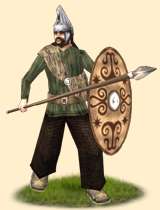Getikoi Stratiotai (Dacian Light Phalanx)
 |
Weapons | Defence | Mental | ||||||
|---|---|---|---|---|---|---|---|---|---|
| Primary | Secondary | Armour: | 7 | Morale: | 13 | ||||
| Type: | spear | sword | Shield: | 3 | Discipline: | normal | |||
| Attack: | 14 | 10 | Skill: | 10 | Training: | highly_trained | |||
| Charge: | 6 | 6 | Recruitment | Other | |||||
| Lethality: | 0.13 | 0.13 | Soldiers: | 40 | Hit Points: | 1 | |||
| Range: | 0 | 0 | Cost: | 1188 | Mass: | 1.2 | |||
| Ammo: | 0 | 0 | Upkeep: | 297 | |||||
| Turns: | 1 | ||||||||

The Getikoi Stratiotai are dependable, phalanx-capable medium infantry, drawn from the more-Hellenized Getic tribes.
The tribes that came into contact with the Hellenic poleis founded on the western shores of the Pontos Euxeinos formed a distinct breed of warriors. These men were renowned for their fierceness, and all Makedonian expeditions sent against them effectively disappeared in the "Getic wasteland", while Makedonian kings like Lysimachos knew Getic captivity. Their contact with the Hellenic poleis made them well familiarized with the phalanx formation. These men are equipped with Phrygian helmets, padded leather armor and large oval shields. For weapons, they carry a spear and a sica into battle, similar to most Hellenic phalanx soldiers.
Historically, the Getai who lived near the western shore of the Pontus Euxine were the most Hellenized. They were praised and feared as mercenaries. They were also very successful in some of their battles against the Greeks, and later against the Romans. Due to the more relaxed phalanx they adopted and favored by their light armor the Hellenes often engaged them against non-phalanx medium infantry, like peltastai or thureophoroi. Herodotos wrote that these Getai were “the bravest and most righteous of all Thraikians”. Most take this to mean they were the most dogmatic of the Thraikians, fitting the religious zeal the Getai often showed later. They often showed pragmatism when dealing with the Hellenic colonies, often forcing these into a protectorate status; their direct commercial and cultural contacts with the poleis helped them to rapidly advance to high degrees of civilization, although their tribal traditions still held strong.